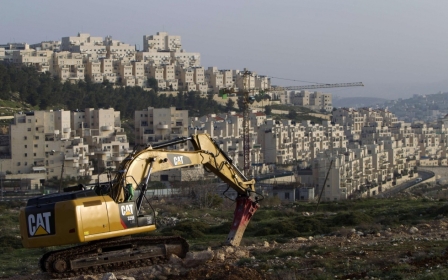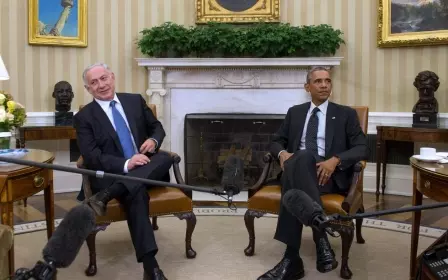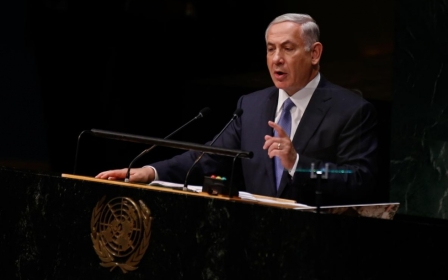Property takeover causes deep concern for residents of Silwan
Settlers are attempting to occupy apartments and establish permanent residence in Silwan which is home to more than 30,000 Palestinians

The East Jerusalem neighborhood of Silwan is already a place of heightened tension (AFP)
Published date: 13 February 2015 01:30 GMT
|
Last update: 9 years 9 months ago
JERUSALEM: In an unprecedented move, a group of Israeli settlers have taken over around twenty apartments in Silwan, a Palestinian neighbourhood at the heart of Jerusalem. In the early hours of Tuesday morning, and under a heavily armed private security escort, the settlers entered seven buildings across the neighbourhood and established an apparently long-term presence there.
Today, the Palestinian residents of Silwan are adjusting to their new reality. With the potential to house up to 100 people, the takeover could double the settler population in the neighbourhood, radically altering the levels of tension and insecurity in a community that has long felt it’s on the brink.
“It’s a huge shock,” Nihad Siam, at the neighbourhood’s Wadi Hilweh Information Centre, told Middle East Eye. “I still feel I’m one of the people that’s still in shock. I can’t believe what’s happened.”
In the shadow of Al Aqsa Mosque and just 300 metres from Jerusalem’s Old City, Silwan is no ordinary neighbourhood. It’s considered the site of the Ancient City of David, the Talmudic centre of Eretz Israel and a place that’s crucial to Jewish history in Jerusalem. It’s also a modern community that’s home to more than 30,000 people. The combination makes it a tinderbox: what Daniel Seidemann, an attorney and founder of non-profit Terrestrial Jerusalem, calls the cities - even the entire region’s – “Axis Mundi.”
Visit Silwan today, and you’ll immediately be struck with its historic and sacred significance. Dominating the area’s entrance is the City of David Park, a theme attraction that showcases the biblical history of Jerusalem through archaeology, light shows and trips through ancient tunnels. Hordes of Americans and Europeans in shorts and dresses shuttle from the Western Wall and Haram al-Sharif to pre-booked tours of the “city of kings and prophets.” Few venture the fifty metres or so beyond, past Al-Salam Mini Market and the Wadi Hilweh information centre, to the tightly-packed slopes of Silwan itself.
On Wednesday, the entrance to the neighbourhood was choked with fortified vehicles, and a regular changeover of police in full riot gear made their way down the hill to the seven buildings where Israeli settlers now live.
“This will cause a lot of problems for us,” said Faisal, who’s sitting with his large family in his garden. He was one of the many Silwan residents who awoke on Wednesday morning to find, to his dismay, that his usual neighbours had been replaced by a group of settlers and a heavy police presence. ”Our life is very difficult now. Everything will change. We have a lot of children in my family. We need the space for them to play and we need freedom to move.”
The family say their neighbours sold their home to an intermediary, who then passed it on to the settler group. Although the precise details about how the settlers acquired the buildings are darkened by rumour and uncertainty, it seems clear that the houses were not seized by force, and that most were likely purchased in market transactions.
At his offices in West Jerusalem, Seidemann - who has been representing families from Silwan for decades - is confident that the acquisitions were likely made through a purchase. The context of that transaction, however, and the occupied status of East Jerusalem, makes it far from a legally sound free market deal.
“The question that gets asked time and time again is “what’s wrong with people buying property?” And if you position the camera and frame it that way, the settlers are quite right,” Seidemann told MEE. “But if you pull the camera back we see that in terms of context, and in terms of consequences, this is not just a real estate transaction.
“This could not take place without occupation. This could not take place without the massive material support from the highest echelons of the Israeli government,” he continued. “Without the massive government support in Silwan, these purchases could not have taken place, they could not have taken place in a completely different context.”
The support Seidemann refers to is received by an organisation called “Elad,” or the “Ir David Foundation” – a right-wing, private settler group that’s thought to be behind this week’s takeover. Elad has been coordinating and funding settler inroads into the neighbourhood of Silwan since 1991.
In the past, the process was purely through what Seidemann terms “house to house combat,” the stealthy acquisition - often through purchases from residents themselves or intermediaries - of homes across the neighbourhood. In the more recent decade, however, it’s been driven by control of public spaces: parks, tourist attractions and heritage sites. And even more importantly, Elad uses archaeology as a tool to stake a powerful claim on the neighbourhood of Silwan, which it calls the City of David, “the heart of ancient Jerusalem.” The plush visitor’s centre at the entrance to the site is Elad’s creation, and the excavations across Silwan are a joint project with the Israeli Antiquities Authority. In conjunction with other government bodies, Elad controls expansive areas of historic importance all over the neighbourhood.
For the Ir David Foundation and the settlers, the ground below Silwan is the foundation of Israel’s heritage, the country’s very reason to be. Representatives of Elad were unavailable to comment for this article. But Seidemann said contiguity between this biblical Jerusalem and the modern city is crucial to the project. The end game he believes, is to make “a continuation of the Jewish Quarter of the Old City,” in which Palestinians could be a “tolerated minority” at best.
For those living in Silwan right now, that means “Hebronisation”: a situation, like that in the West Bank city of Hebron, in which heavily armed and fortified settlement enclaves scatter the neighbourhood, leading to militarisation and high levels of tension and violence.
“It’s a state within a state,” Siam, at the Wadi Hilweh Centre, said as he gestured to the armoured vehicle trundling down the hill. “Here, the settlers have security, they have protection; they have the right to stop and question and search us wherever we are. If any problems happen, the police don’t want to do anything to help us. They assume we’re guilty so they arrest us. We don’t trust the police, we feel afraid to speak to them.”
Where the enclaves have just been established, the dynamic is indeed uneasy and tense. Neighbours point to hastily-constructed walls around the newly occupied buildings, there are bars on the windows and police in grey khaki lounge and chat around the doorways. In one window, a young settler gives the thumbs up and grins to his new neighbour. The gesture is not reciprocated.
Homes hung with Israeli flags, the first of which have been occupied since 1991, offer some clue to what the new acquisitions will look like in the future. A great deal of effort has obviously gone into the security of these homes, with bars on the windows and a fortified metal grid concealing the front door. Somewhat incongruously, a neatly-printed Hebrew label sits below the doorbell of one house. In front and just beyond it, the public stairway is angular and clean, with polished terracotta tiles.
Just beyond it, however, the path becomes broken concrete, muddy and rubbish-strewn. Palestinians say any prosperity the settlers might bring is limited to their own tiny enclaves, while the majority population in Silwan - just 500 Israeli Jews live here among tens of thousands of Palestinians - are marginalised and forgotten.
“Since 1967 until the settlers came to live here there was nothing, no development at all in Silwan,” Nihad said. “Now, they say the development is to our advantage, but it’s not - it’s just to the settlers’ advantage. Services for an Israeli are not the same as services for an Arab, for the Palestinian. I am paying my money to the municipality, but I don’t get the same things.”
Despite the announcements of Economy Minister, Naftali Bennett, who announced that Tuesday’s development created a Jewish majority in Silwan, the new enclaves are still in an obviously Palestinian neighbourhood. But for its residents, the new settlements will mean the reality of this community is fundamentally changed.
“It’s the pressure on us. Every time I leave the house I feel the pressure,” Nihad said. “The people now are talking about struggle but what can they do? The settlers have a success. I hate to say it, but they have a success. They have made the people disappointed. And they have made it so that there’s no trust between the people living around each other. That’s a success.”
New MEE newsletter: Jerusalem Dispatch
Sign up to get the latest insights and analysis on Israel-Palestine, alongside Turkey Unpacked and other MEE newsletters
Middle East Eye delivers independent and unrivalled coverage and analysis of the Middle East, North Africa and beyond. To learn more about republishing this content and the associated fees, please fill out this form. More about MEE can be found here.




